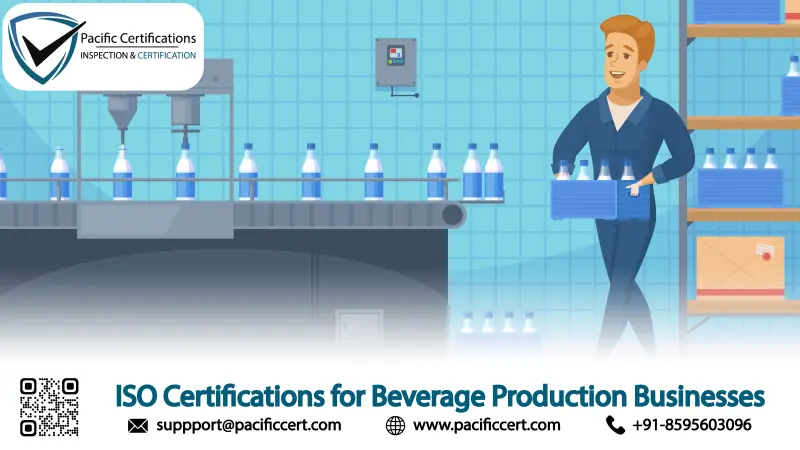ISO Certifications for Beverage Production Businesses, Requirements and Benefits

Introduction
Beverage production businesses operate in a highly regulated and quality-sensitive environment where food safety, product consistency, hygiene, traceability, and brand trust are critical. These businesses include manufacturers of soft drinks, juices, bottled water, dairy beverages, energy drinks, alcoholic beverages, and functional drinks, managing activities such as raw material sourcing, formulation, processing, filling, packaging, storage, and distribution.
With rising consumer awareness, stricter food safety enforcement, export compliance requirements, and sustainability expectations, beverage manufacturers are under increasing pressure to demonstrate robust management systems. ISO certifications have therefore become an essential framework for beverage production businesses to ensure safe products, consistent quality, regulatory compliance, and long-term credibility with retailers, distributors, and consumers.
In beverage manufacturing, consumer trust is bottled long before the product reaches the shelf.
Quick Summary
ISO certifications provide beverage production businesses with internationally recognized frameworks to manage food safety through ISO 22000, product quality through ISO 9001, environmental responsibility through ISO 14001, occupational health and safety through ISO 45001, energy efficiency through ISO 50001, information and traceability controls through ISO/IEC 27001, and business continuity through ISO 22301. These certifications help beverage manufacturers improve product safety, meet regulatory and export requirements, and strengthen brand confidence.
For more information on how we can assist your beverage production business with ISO certifications, please contact us at [email protected].
Applicable ISO Standards for Beverage Production Businesses
Below are the most relevant ISO standards applicable to beverage manufacturing plants and bottling facilities:
ISO 22000: Food Safety Management System (FSMS)
ISO 22000 is the foundation standard for beverage production. It integrates HACCP principles with prerequisite programs to control hazards related to raw materials, water quality, processing, filling, packaging, storage, and distribution, ensuring food safety across the beverage supply chain.
ISO 9001: Quality Management System (QMS)
ISO 9001 supports structured control of formulation consistency, production planning, in-process testing, packaging integrity, customer feedback, and continual improvement, ensuring uniform product quality across batches.
ISO 14001: Environmental Management System (EMS)
Beverage manufacturing involves high water usage, wastewater discharge, packaging waste, and energy consumption. ISO 14001 helps organizations manage environmental impacts and comply with environmental regulations.
ISO 45001: Occupational Health & Safety (OHSMS)
Production plants involve machinery, pressurized systems, chemicals, and manual handling. ISO 45001 provides a framework to manage workplace hazards and improve employee safety.
ISO 50001: Energy Management System (EMS)
Heating, cooling, bottling, and refrigeration are energy-intensive. ISO 50001 enables systematic energy performance improvement and cost reduction.
Click here to find out more applicable standards to your industry
What are the Requirements of ISO Certifications for Beverage Production Businesses?
Beverage manufacturers seeking ISO certification must establish and maintain documented policies, procedures, and records aligned with the selected ISO standards. Key requirements include the following:
ISO 22000:2018 – Food Safety Management Systems
Establish food safety policies and objectives
Conduct hazard analysis and implement control measures
Maintain traceability, recall, and hygiene programs
ISO 9001:2015 – Quality Management Systems
Define controlled production and quality processes
Monitor product conformity and customer requirements
Implement corrective actions and continual improvement
ISO 14001:2015 – Environmental Management Systems
Identify environmental aspects and impacts
Control water usage, waste, and emissions
Monitor regulatory compliance
ISO 45001:2018 – Occupational Health and Safety
Identify workplace hazards and risks
Implement safety controls, training, and emergency response
ISO 22301:2019 – Business Continuity Management
Identify critical production and supply activities
Develop contingency and recovery plans
Tip:Start by mapping your beverage production lifecycle—from water sourcing and formulation to filling, packaging, storage, and distribution—against ISO requirements to identify food safety, quality, and compliance gaps early.
For further information on how we can assist your beverage production business with ISO certifications, contact us at [email protected].
What are the Benefits of ISO Certifications for Beverage Production Businesses?
ISO certifications are suitable for soft drink manufacturers, juice processors, bottled water plants, breweries, distilleries, and dairy beverage producers. Key benefits include:
Improved food safety and hygiene controls, reducing contamination risks.
Consistent taste, quality, and packaging integrity, strengthening brand trust.
Enhanced compliance with food laws and export standards, easing approvals.
Better control of water, energy, and waste, reducing environmental impact.
Safer working conditions for employees, lowering accident risks.
Stronger credibility with retailers, distributors, and regulators, supporting growth.
Global beverage consumption continues to grow as demand increases for packaged drinks, functional beverages, and ready-to-drink products. Industry research indicates that the global beverage market is expected to exceed USD 1.9 trillion in the near future, with strong growth in Asia-Pacific, Africa, and Latin America. At the same time, regulators are tightening food safety inspections, water usage controls, and sustainability reporting requirements.
Benchmarking shows that beverage manufacturers implementing structured food safety and quality management systems achieve 20–30% reductions in product non-conformities, recalls, and regulatory findings. Looking forward ISO 22000-aligned governance is expected to become a baseline requirement for beverage producers supplying organized retail chains, export markets, and multinational brands.
How Pacific Certifications Can Help
Pacific Certifications, accredited by ABIS, acts as an independent certification body for beverage production businesses by conducting impartial audits against applicable ISO standards. Our role is to objectively assess whether documented management systems and manufacturing practices conform to international ISO requirements, based strictly on verifiable evidence and operational records.
We support beverage manufacturers through:
Independent certification audits conducted in accordance with ISO/IEC 17021
Practical assessment of real food safety, quality, and compliance processes
Clear audit reporting reflecting conformity status and certification decisions
Internationally recognized ISO certification upon successful compliance
Surveillance and recertification audits to maintain certification validity
If you need support with ISO certification for your beverage production business, contact us at [email protected] or +91-8595603096.
Author:Ashish
Ready to get ISO certified?
Contact Pacific Certifications to begin your certification journey today!
Suggested Certifications –
Read more: Pacific Blogs

